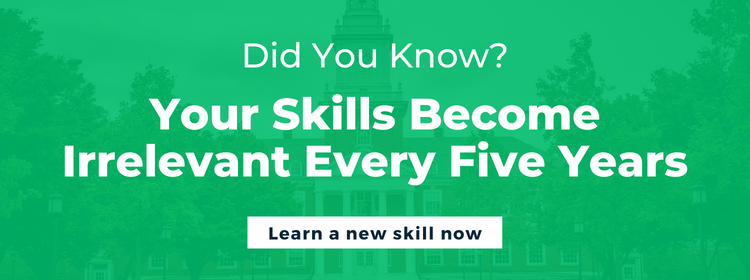5 Top Career Mistakes That Can Slow Down Professional Growth

In his book The Career Manifesto, Mike Steib says: “The biggest mistake in your career is to believe that you have no control over it. No matter how powerful, entrenched, or complex the system may seem, you always have the power to steer your career in the direction you want it to go.” Making and learning from career mistakes is integral to professional growth. However, some mistakes can bring down your career graph. This blog discusses people’s most common career mistakes and how to fix them.
Top 5 Career Mistakes and How to Fix Them
1. Creating Only Short-Term Goals
Focusing only on short-term goals is one of the biggest career mistakes you can make. It limits your vision and prevents you from achieving your full potential. Even though short-term goals are important for focusing your efforts and making quantifiable progress, they may not necessarily help you achieve your long-term aspirations. You may miss out on growth opportunities. And the development that can lead to bigger and better things in the future. Here is you can fix this mistake:
- Assess your long-term aspirations: Reflect on where you want to be in the next 5, 10, or 20 years. Consider what kind of impact you want to make in your field. And what kind of lifestyle you want to have and what kind of legacy you want to leave. This can help you set long-term goals that align with your vision.
- Create a roadmap: Once you have a clear vision of your long-term aspirations, create a roadmap that outlines the steps you need to take to get there. Identify the milestones you must achieve along the way, and set short-term goals aligning with each milestone.
- Stay flexible: Remember that your career path may not always go according to plan. Remain flexible and be willing to adapt your roadmap as needed. This can help you stay focused on your long-term aspirations.
2. Not Building Strong Relationships at Work
One of the major reasons cited for the former CEO of Yahoo Marissa Mayer’s downfall was her inability to foster strong professional relationships with her peers and colleagues. Despite being known for her exceptional technical skills, Mayer was criticized for lacking communication and collaboration with other executives. This made it difficult to implement changes and build momentum for the company.
Building strong professional relationships with colleagues, supervisors, and mentors can open doors to new career opportunities. It also helps you gain valuable feedback and insights and provide support and guidance.
It also helps you stay connected and informed about industry trends, new job opportunities, and other important developments that could impact your career trajectory. If you are making the mistake of not building a professional network, here is how you can work on it:
- Communicate clearly and often: Good communication is the foundation for any strong relationship, so communicate regularly and clearly with your colleagues. This includes listening actively, expressing your ideas and concerns clearly, and asking for feedback and input.
- Seek opportunities for collaboration: Look for opportunities to work with colleagues on projects or initiatives, and be willing to contribute your skills and expertise to the team. This can help build trust and respect among your colleagues.
- Show appreciation and support: Recognize and appreciate your colleagues’ contributions, and offer support when needed. This helps foster a sense of teamwork.
- Be open to feedback: Being willing to receive feedback from your colleagues can help you see things from their perspective and connect with them.
3. Refusing to Unlearn
As your career progresses, you encounter various new trends, strategies, and methodologies. While learning is important, unlearning traditional concepts hold equal value.
To see how ignoring this can impact your career, take the case of Kodak’s former CEO, George M. C. Fisher. Kodak once dominated the photography industry, but the company struggled to keep up with the digital photography revolution in the late 1990s and early 2000s. Why? Despite warnings from employees and industry experts that digital photography was the future, Fisher was slow to invest in digital technology and instead focused on cutting costs and streamlining Kodak’s existing operations. He struggled to unlearn traditional methodologies. As a result of this unwillingness to unlearn and adapt, Kodak struggled to compete with newer, more agile competitors like Canon and Sony and eventually filed for bankruptcy in 2012.
This example illustrates how not unlearning the old way of doing things in a highly competitive world can become one of your biggest career mistakes. Here’s how you can fix it:
- Learn from others: Seek out diverse perspectives and ideas from people who have different experiences and backgrounds from your own. This can help challenge your assumptions and expand your thinking.
- Embrace new experiences: Trying new things and stepping outside your comfort zone can help you build new skills and develop a more flexible mindset.
ALSO READ: Learning to Unlearn: The Importance of Unlearning and How to Use it
4. Not Upskilling Yourself Constantly
Failing to upskill can limit your growth potential and prevent you from staying competitive in the job market. As technology advances and industries evolve, the skills in demand a few years ago may no longer be relevant today. If you don’t actively seek out opportunities to upskill and stay on top of the latest trends and technologies, you may fall behind your peers and struggle to advance in your career.
To avoid one of these biggest career mistakes here is what you can do:
- Take online courses: Upskill yourself by attending workshops and conferences and seeking on-the-job training opportunities. This can help you stay relevant and valuable in your industry and position you for long-term success in your career
- Be proactive: It’s important to seek opportunities to learn and grow rather than wait for your employer to provide them. By taking ownership of your professional development, you can stay ahead of the curve and build a fulfilling career
5. Seeking Advice From Multiple People
Pepper Hayes, Director of Development Operations & Communications at BUILD.org, in an essay titled ‘Expensive Mistakes: How Hitting Career Rock Bottom Showed Me What I Really Learned in Honors,’ explains how she crowdsourced her career decision after completing her honors. As a result, she ended up studying law, which wasn’t really for her.
She said seeking advice from multiple people about what she should do next was her first career mistake. And it’s not just her: a lot of people do this. They turn to their peers and family for career advice. This often results in unstrategic decisions that ultimately hamper career growth.
So how to fix this? It’s simple: Seek advice from professionals. You can reach out to trained career coaches or mentors who are qualified and have the professional experience and industry expertise to help you make informed career choices.
Career Growth with Emeritus
Career growth and development require a lot of learning, unlearning, persistence, consistency, correct decision-making, and the ability to take risks. Not only can you avoid making career mistakes, but you can also advance your professional development by learning the right skills and gaining practical experience. Emeritus can help you with this. Explore its skill-oriented online courses to set you up for a rewarding career.
By Sneha Chugh
Write to us at content@emeritus.org



